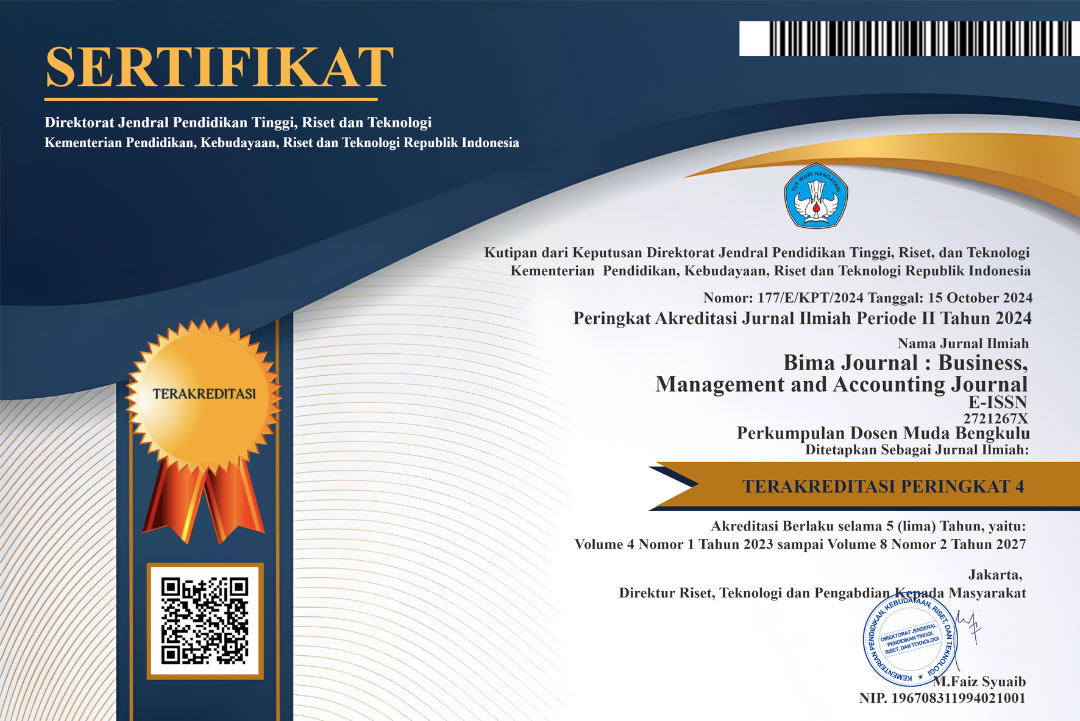EFFECT OF EDUCATION AND TRAINING (DIKLAT / BIMTEK), UNDERSTANDING OF REGIONAL FINANCIAL ACCOUNTING SYSTEMS (SIMDA) ON PERFORMANCE OF REGIONAL FINANCIAL MANAGEMENT
DOI:
https://doi.org/10.37638/bima.1.1.61-72Keywords:
Understanding of Simda, Education and Training, Organizational CommitmentAbstract
This study examines the effect of Education and Training (Diklat / Bimtek), Understanding of the Regional Financial Accounting System (Simda) on the Performance of regional financial managers. This research was conducted on 60 regional financial managers in 33 Regional Government Work Units (SKPD) Bengkulu City Government. This study collected data by giving questionnaires to respondents. Research data were processed using the SPSS program.
The results of the study prove that Education and Training (Diklat / Bimtek), Understanding of the Regional Financial Accounting System (Simda) has a positive effect on the performance of regional financial managers. This proves that the better the management carried out by the regional government towards Diklat / Bimtek, the understanding of Simda which is owned by the regional financial managers in the SKPD, the better the performance of regional financial managers. Bengkulu City regional government to continue to improve the existing Diklat / Bimtek model, together with increasing understanding of Simda towards local government SKPD.References
Achmad S. Ruky, 2006. Sistem Manajemen Kinerja, Gramedia Pustaka Utama, Jakarta.
Abidin, Zainal, 2003. Hubungan Karakteristik Individu dan Pendidikan Latihan dengan Kinerja Pegawai Dinas Pendidikan Nasional Kota Lubuklinggau, Tesis. Program MM Universitas Bengkulu, tidak dipublikasikan.
Anwar, Prabu, 2002. Reformasi Administrasi, PT. Grasindo, Jakarta.
Astuti, Maulidah Tri, 2008. Pengaruh Penerapan Sistem Informasi Akuntansi Terhadap Kinerja Individu, Brawijaya. Malang.
Azhar, Susanto. 2007. Sistem Informasi Akuntansi. T. Lingga Jaya, Jakarta.
As’ad, Moch. 2003. Manajemen Personalia dan Sumber Daya Manusia, BPFE, Yogyakarta.
Armstrong, Michael. 1998. Performance Management : The New Realities, Institute Of Personel And Development, New York.
Bastian, Indra. 2010. Akuntansi Sektor Publik: Suatu Pengantar. Jakarta: Erlangga.
Berhardin, H., 2000. Human Resources Management, McGraw Hill, New York.
Boyatzis, R,E, Ron, S. 2001. Unleashing the Power of Self Directed Learning,. Case Western Reserve University, Cleveland, Ohio, USA.
Davis, F.D. dan Venkatesh, V. 2000. A Theoretical Extension of The Technology Acceptance Model: Four Longitudinal Field Studies. Management Science, 46(2), 186-204
Davis, J., and Donaldson, L., 1994. The Theory of Stewarship, Working Paper. University of Notre Dame.
Devis, K., 1996. Human Resources Management, Prentice Hall, New York.
Dominggus, Pirade, dkk. 2013. Pengaruh Penggunaan Sistem Informasi Pengelolaan. Keuangan Daerah (SIKPD) Terhadap Kinerja Pegawai di Kabupaten Tana. Toraja. Jurnal Analisis, vol. 2 no 2, hal 182-193, Universitas Hasanudin.
Djauhari, H. Nurdin, 2008. Hubungan Antara Pendidikan-Latihan dan Masa Kerja Dengan Kinerja Pejabat Penyusun Rencana Anggaran Satuan Kerja (RASK) di Lingkungan Pemerintah Kota Pagaralam. Tesis Program MM Unib, tidak dipublikasikan.
Erwin. 2016. Pengaruh Penerapan Sistem Informasi Manajemen Keuangan Daerah (Simda), Sistem Pengendalian Intern, Kompetensi Aparatur Dan Ketaatan Standar Akuntansi Pemerintahan Terhadap Kualitas Laporan Keuangan Pemerintah Kabupaten/Kota. Tesis Pascasarjana Univ Khairun Ternate.
Estiningsih, Retno Utami, 2008. Penerapan Learning Organizations Bagi pengembangan SDM Organisasi. http.www.tabloit-tawon com.
Feriyanto, John, 2005. Hubungan Karakteristik Individu dan Pendidikan Pelatihan dengan Kinerja Lurah di lingkungan Kecamatan Curup Kabupaten Rejang Lebong, Tesis. Program MM Unib, tidak dipublikasikan.
Ghozali, Imam, 2013. Aplikasi Analisis Multivariat dengan Program IBM SPSS 21. Edisi 7, Penerbit Universitas Diponegoro, Semarang.
Halim, Abdul. 2008. Auditing : Dasar-dasar Audit Laporan Keuangan.Unit Penerbit dan Percetakan STIM YKPN. Yogyakarta
------------------. 2007. Akuntansi Sektor Publik Akuntansi keuangan daerah, Edisi Revisi, Jakarta, Salemba Empat.
Jogiyanto, 2010. Analisis dan Desain Sistem Informasi, Edisi IV, Andi Offset, Yogyakarta.
Kurnia, Nia, 2005. Pengaruh Latar Belakang Tingkat Pendidikan terhadap Kinerja Aparatur Pemerintah Daerah, Universitas Pendidikan Indonesia, Bandung.
Mahsun, Mohamad, 2006. Pengukuran Kinerja Sektor Publik,. Penerbit BPFE, Yogyakarta
Mardiasmo. 2009. Akuntansi Sektor Publik, Yogyakarta: ANDI.
Martin. 2000. Aplikasi EQ Based HR Management System. Majalah Manajemen.
Marlia, Harapan. 2014. Pengaruh Tingkat Pendidikan Pengalaman Kerja, Gaji dan Komitmen Organisasi terhadap Kinerja Pengelola Keuangan pada Satuan Kerja Perangkat Daerah (SKPD) Kabupaten Lebong. Universitas Bengkulu
Mahmudi. 2007. Manajemen Kinerja Sektor Publik. Yogyakarta: UPP. STMYKPN.
Martoyo, Susilo. 2000. Manajemen Sumber Daya Manusia. Yogyakarta: BPFE
Mondy, R Wayne. 2008. Manajemen Sumber Daya Manusia. Jakarta: Erlangga.
Mowday, R. T., Steers, R. M.,&Porter, L.W. 1979,. The measurement of organizational commitment. Journal of Vocational Behavior, 14, 224–247.
Mulyadi. 2001. Sistem Akuntansi. Edisi Tiga. Jakarta : Salemba Empat.
Muth, Meilinda M, and Lex D, 1998. Stewarship Theory and Board Structure: a contingency approach. Scholarly Research and Theory Papers, Volume 6 Nomor 1. pp 5-28.
Nasarudin, Fadliah. 2008. Pengaruh Pendidikan, Pelatihan dan Pengalaman Kerja Terhadap Kualitas Penyajian Informasi Akuntansi Pada Bank Negara Indonesia Tbk. Jurnal Ichsan Gorontalo, Volume 3 Nomor 1. Februari-April 2008.
Nasution, 2005, Total Quality Management, PT Gramedia Pustaka Utama: Jakarta.
Nordiawan, Deddi dan Ayuningtyas Hertianti. 2010. Akuntansi Sektor Publik. Edisi Kedua. Jakarta: Salemba Empat.
Putri, Gustika Yolanda. 2013. Pengaruh Komitmen Organisasi dan Sistem Pengendalian Intern Terhadap Kinerja Manajerial SKPD (studi empiris pada satuan kerja perangkat daerah kota Padang). Jurnal Akuntansi, Vol. 1 No. 1 hal 1-10.
Raharjo, Eko. 2007. Teori Agensi dan Teori Stewardship Dalam Perspektif Akuntansi. Fokus Ekonomi. Vol. 2 No. 1, pp l 37-146.
Rajana HRP, Junita P. 2009. Pengaruh Pemahaman SAP, Pendidikan, dan Pelatihan Terhadap Penyusunan Laporan Keuangan SKPD. Tesis Tidak Dipublikasikan, USU. Medan.
Ratih, Asri Eka, 2012. Pengaruh Pemahaman Sistem Akuntansi Keuangan Daerah, Penatausahaan Keuangan Daerah, dan Pengelolaan barang Milik Daerah Terhadap Kinerja SKPD Pada Pemerintahan Provinsi Kepulauan Riau. Tesis Tidak Dipublikasikan, Sekolah Pasca Sarjana, Sumatera Utara.
Robert, Bacal, 2005. Performance Management, Gramedia Pustaka Utama, Jakarta.
Rohman, Abdul, 2009. Pengaruh Implementasi Sistem Akuntansi, Pengelolaan Keuangan Daerah Terhadap Fungsi Pengawasan dan Kinerja Pemerintah Daerah (Studi Pada Pemda di Jawa Tengah). Jurnal Akuntansi dan Bisnis, Volume 9, Nomor 1,
Republik Indonesia, 2004. Undang-Undang Nomor 32 Tahun 2004 Tentang Pemerintahan Daerah.
…………, 2004. Undang-Undang Nomor 33 Tahun 2004 Tentang Perimbangan Keuangan antara Pemerintah Pusat dan Daerah.
Sari, Erna, 2013. Pengaruh Pemahaman Sistem Akuntansi Pemerintahan, dan Penatausahaan Keuangan Daerah Terhadap Kinerja Pengelola Keuangan Daerah. Jurnal Fairness, Volume 3, Nomor 3, 19-29.
Sihite, Tiurlina Hasmawati. 2012. Pengaruh Pendidikan Dan Pelatihan (Diklat) Serta Motivasi Terhadap Kinerja Pegawai Di Sekretariat Daerah Kabupaten Tapanuli Tengah. Tesis. Program Magister Manajemen Program Pascasarjana Universitas Terbuka Jakarta.
Sugiyono. 2016. Metode Penelitian Kuantitatif, Kualitatif dan R&D. Bandung: PT Alfabet.
Supratman, Acu, 2005. Hubungan Pendidikan dan Pelatihan dan Motivasi dengan Produktivitas Kerja Manajer Tingkat Pertama pada Kantor Pusat PT. Kereta Api Indonesia. Tesis, Jurusan Pendidikan Ilmu Pengetahuan Sosial, Universitas Pendidikan Indonesia, Bandung.
Widjajanto, Nugroho. 2001. Sistem Informasi Akuntansi. Erlangga: Jakarta
Wilkinson, J. W. 1992. Accounting and Information Systems. John Wiley & Sons, Inc
www.BPKP.go.id
Zahara, Naily, 2008. Pengaruh Pelaksanaan Program Diklat, Pengalaman Kerja, Terhadap Kinerja Karyawan Bagian Keperawatan RSUD. RAA. Soewondo Pati. Univ Muhammadiyah-Surakarya
Downloads
Additional Files
Published
Issue
Section
License
An author who publishes in the BIMA JOURNAL: Business, Management, and Accounting Journal agrees to the following terms:
Author retains the copyright and grants the journal the right of first publication of the work simultaneously licensed under the Creative Commons Attribution-ShareAlike 4.0 License that allows others to share the work with an acknowledgement of the work's authorship and initial publication in this journal
Submission of a manuscript implies that the submitted work has not been published before (except as part of a thesis or report, or abstract); that it is not under consideration for publication elsewhere; that its publication has been approved by all co-authors. If and when the manuscript is accepted for publication, the author(s) still hold the copyright and retain publishing rights without restrictions. For the new invention, authors are suggested to manage its patent before published. The license type is CC-BY-SA 4.0.
BIMA JOURNAL: Business, Management and Accounting is licensed under a Creative Commons Attribution-ShareAlike 4.0 International License.
You are free to:
Share — copy and redistribute the material in any medium or format
Adapt — remix, transform, and build upon the material
for any purpose, even commercially.
The licensor cannot revoke these freedoms as long as you follow the license terms.
Under the following terms:
Attribution — You must give appropriate credit, provide a link to the license, and indicate if changes were made. You may do so in any reasonable manner, but not in any way that suggests the licensor endorses you or your use.
ShareAlike — If you remix, transform, or build upon the material, you must distribute your contributions under the same license as the original.
- No additional restrictions — You may not apply legal terms or technological measures that legally restrict others from doing anything the license permits.
Notices:
- You do not have to comply with the license for elements of the material in the public domain or where your use is permitted by an applicable exception or limitation.
- No warranties are given. The license may not give you all of the permissions necessary for your intended use. For example, other rights such as publicity, privacy, or moral rights may limit how you use the material.





















